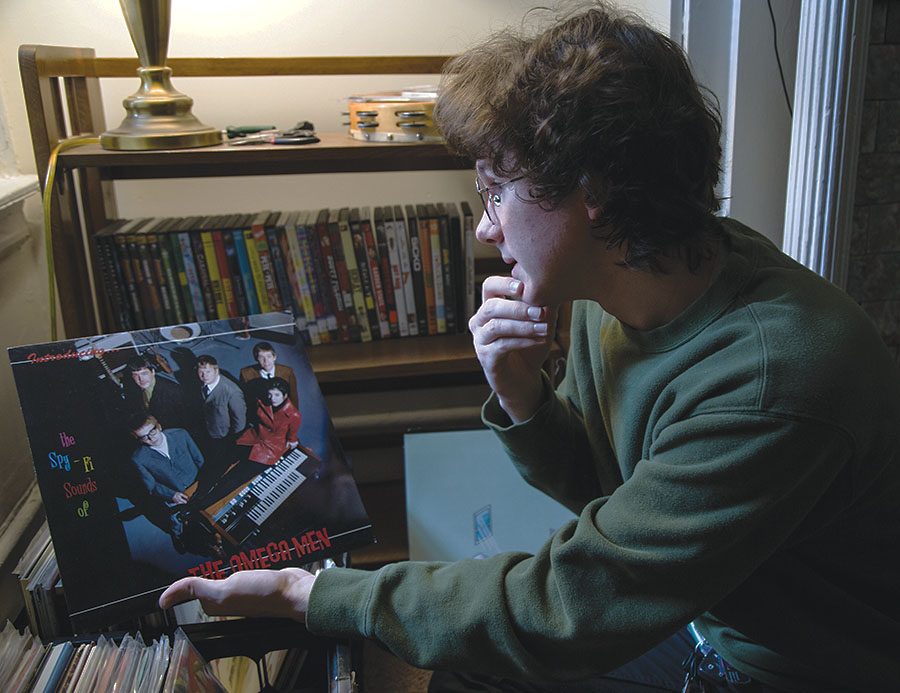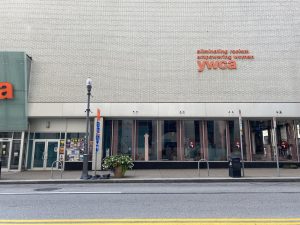Students jam to tunes through varied methods
Local record stores, streaming services sell to students
November 28, 2017
Alec Ebeling, junior creative writing major, sifted through their record collection and revealed a few favorite vinyls along with an album by their father’s old band “The Spy-Fi Sounds of The Omega Men.”
“I like vinyl because it appeals to me as a collector of things, getting that physical album art in your hands; it’s nice, big and you can see it really well,” Ebeling said.
Many students prefer streaming their music through services like Spotify and Apple Music while some enjoy the tangibility of physical albums – whether vinyl, CDs or cassettes.
In September, Spotify partnered with Hulu and released a premium bundle at $4.99 a month for students. Apple Music also has a student discount for $4.99 a month to use their services. Additionally, there are a multitude of music stores in Pittsburgh including Amazing Books and Records on Liberty Ave or in Squirrel Hill, Desolation Row Records in Oakland on Craig Street, Eides Entertainment on Penn Ave, Jerry’s Records in Squirrel Hill and Dave’s Music Mine on East Carson St.
Ebeling has been collecting records since eighth grade, but most frequently uses the popular streaming device, Spotify. However, they still prefer vinyl for aesthetic reasons. Ebeling particularly enjoys colored vinyl and the way vinyl sounds versus digital music.
“Musically, it sounds warmer and more ‘there’ than a digital file like how a CD would sound,” Ebeling said.
Vanessa Vivas, freshman theater arts major, grew up visiting music stores and buying CDs while living in Doha, Qatar.
“I was the person who went to music stores and bought physical copies,” Vivas said. “There’s another dimension to it, it is something tangible. Sometimes my family and I still play CDs in the car; we don’t have an aux cord. My family is kind of traditional that way.”
Later on, while still in Qatar, Vivas used Apple Music and YouTube. Now that she is in college, she uses the free, advertisement included version of Spotify.
“Once I moved away and came here to college, I wanted to be more independent,” Vivas said. “Spotify wasn’t available in Qatar.”
The theater arts major primarily listens to a variety of musicals including “Legally Blonde” and “Bring it On.” She says she listens to musicals because of the excitement and relatability. When she is not listening to musicals, she listens to a lot of Halsey and DJ Khaled.
Dylan Kersten, junior global cultural studies major, has also been using Spotify since the beginning of college. Whether on the go, at home or DJ-ing events like weddings for the playlist feature, he prefers Spotify over other streaming devices and other methods of listening to music. He still enjoys listening to full, physical albums “like how the artist intended,” but uses Spotify the most out of convenience.
Both Ebeling and Kersten are in bands that have pages on streaming devices including Spotify and Bandcamp. Ebeling is in Vireo and Typewriters while Kersten is in String Machine and the worship band at his church. Like Kersten, Ebeling listens to Spotify more often than pulling out records due to its convenience.
“It’s not my preferred method but I’m on the go so much, going to class, going out in the car, or even just doing homework. It’s so much easier to use Spotify. It’s instant, it’s right there, it’s all of the music I want to hear,” said Ebeling, who has had Spotify since before it was public.
Because Spotify is easier to use, Ebeling has not bought too many records recently. However they accredit the expansion of their vinyl collection to their father, who still has a huge record collection, and a record store back home in Indiana, Pennsylvania called Backstreet Records.
Before Spotify and listening to full albums, Kersten used an iPod classic and shuffle mode.
“It involved a lot of skipping of weird music that I didn’t delete whereas Spotify is way easier to navigate,” Kersten said.
He has made over 100 Spotify playlists for discovery and specific feelings, but only uses four of them since he prefers listening to full albums of artists now. While Kersten still buys the CDs of local bands, he finds it simpler to find full albums of artists that use Spotify instead of individually buying the physical albums.
Desolation Row Records employee and former history student Alanna Miles believes vinyl is making a comeback. Located in Oakland, the store is essentially on Pitt’s campus, constantly drawing in students who are purchasing vinyl according to Miles.
Miles is constantly listening to music on Spotify, but recently bought a record player to listen to her favorite artist of all time, David Bowie.
“I’ve spent several hundred dollars on his records alone,” Miles said. “I love having records, they’re beautiful art objects. I also just like the sound quality and the practice of putting it on the record player. It’s a really mindful and active way to listen to music.”
Miles said college-age students are constantly coming in the store and purchasing vinyl.
“They buy a lot of hip hop and rap, but they also buy a lot of classic stuff like The Beatles and David Bowie,” Miles said.
Desolation Row sells mostly records and not as many CD’s, as vinyl is becoming popular again, according to Miles. Additionally she says the store is well-curated and everything is worth listening to.
“I’m constantly finding new things to listen to here,” Miles said. “I obsessively listen to the same seven or eight artists while periodically introducing new things into my diet.”
Other than vinyl and streaming methods, Ebeling listens to music on cassettes and even uses them for their band’s music.
“The medium of music going away permanently is CDs, but I think there is a cassette resurgence happening,” Ebeling said. “They’re cheaper and easy to produce at home.”
Contrastingly, Kersten believes physical objects like vinyls, CDs and cassettes can be a hassle to maintain.
“With Spotify, I don’t have to own all these things and know where my CDs are and all that jazz,” Kersten said.
Vivas is surprised at how many students around her are using Spotify. She is still getting used to the service and hopes to learn about the playlist feature among others.
“From what I’ve seen it’s bigger than Apple Music, which is shocking to me because I’ve never been exposed to it before,” Vivas said.
Collectively, Ebeling, Kersten and Miles believe that streaming music will be around for a while above physical methods, though vinyl is reappearing as a popular method of listening to music whether or not they listen to it often themselves. However, Vivas predicts that most physical music might disappear in the future.
“Our world is becoming heavily reliant on technology,” Vivas said. “We’re prioritizing productivity over everything else. I think the reason records might still be available is because certain people still have collections, still have a player and may be attached to the history.”




















